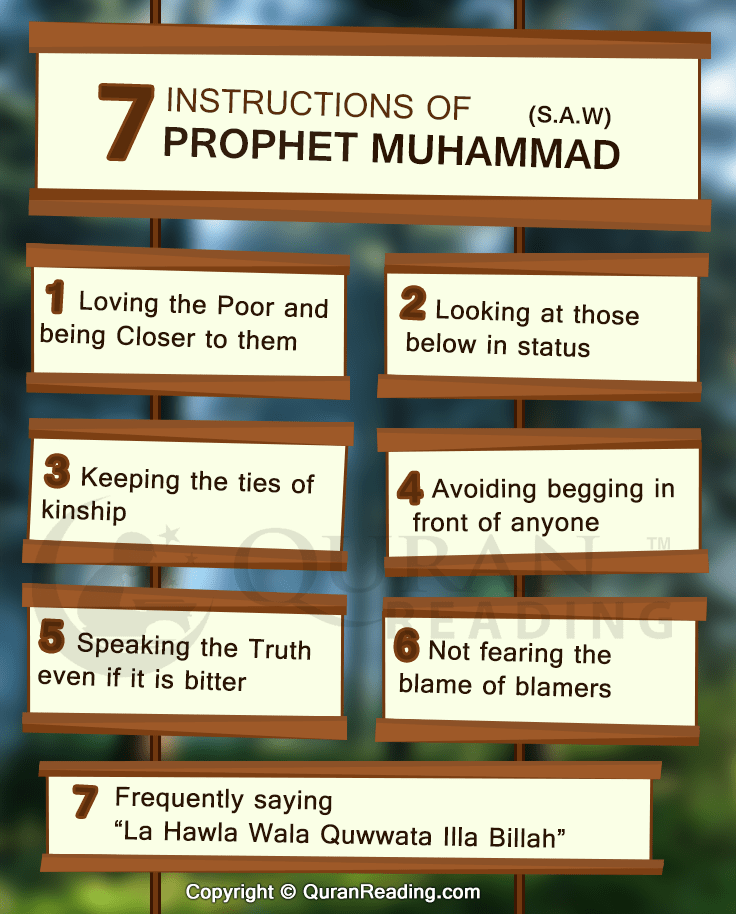
The 7 Instructions of The Holy Prophet PBUH

Hazrat Muhammad ﷺ, right from His early age was a highly distinguished figure among the Qureyshi tribes. He was well known for His truthfulness and trustworthiness. Due to His greatest virtues, He was finally revealed as the Last Messenger of Allah at the age of 40. The entire life of the Holy Prophet ﷺ is an excellent role model for every human being on this planet earth. The Almighty Lord says in the Holy Quran:

There has certainly been for you in the Messenger of Allah an excellent pattern for anyone whose hope is in Allah and the Last Day and [who] remembers Allah often. [Quran, 33: 21]
The above mentioned Ayah declares the Apostle ﷺ of God as the best of the best example for the believers in every walk of life. His obedience has been emphasized to the degree that the Exalted One has compared the Prophet`s ﷺ compliance in life as the matter of completion of one`s religious faith. There is not a single commandment of Allah ordained upon the Muslims which His Messenger ﷺ would not have practiced Himself first.

The 7 instructions of Rasulullah ﷺ which He emphasized on the disciples of Islam to conform to are:
i) Loving The Poor And Being Closer To Them
The Religion of Peace greatly emphasizes on helping the deprived and underprivileged ones. It has been ensured through the obligatory action of Zakah (Charity), one of the five pillars of Islam. Aiding poor people from one`s excessive earnings and possessions is one the most rare and extraordinary act to do which has been made compulsory to perform upon the believers of Allah and His Messenger ﷺ.
The Holy Prophet ﷺ, throughout His life, helped the needy and always instructed His followers to take care of their due necessitates. He ﷺ advised the entire Muslim Ummah to be kind and affectionate to the disadvantaged persons. On one occasion, the Holy Prophet ﷺ said to His Wife, Hazrat A`isha (R.A):
“O Aisha, love the poor and let them come to you and Allah will draw you near to Himself.” (Bukhari)
So, the Apostle ﷺ of Allah, by instructing Ai`sha (R.A) has advised all the Muslims to care for the deprived people. He Himself led a very ordinary life and never wished for any wealth despite being the King and the Reason of existence of the entire universe. He ﷺ used to pray to the Almighty:
“O Allah! Keep me poor in my life and at my death, and raise me at resurrection among those who are poor”’ (Nasai)
This shows that Rasulullah ﷺ has instructed us all to be closer to the poor through His own prayer.
ii) Looking At Those Below In Status
There come many instances in life when one starts to looks at things in a negative way, does not appreciate what it has, and rather glances the possessions and attributes of those who are better than itself. This eventually leads towards feelings of ingratitude towards the Almighty Lord, which in turn leads to His displeasure. Rasulullah ﷺ was always content with His life and never seemed to wish for having more wealth. Abu Hurairah (R.A) reported the Holy Prophet ﷺ saying as:
“When one of you looks at one who stands at a higher level than you in regard to wealth and physical structure he should also see one who stands at a lower level than you in regard to these things.” (Muslim)
In light of the above stated Hadith, instead of looking at more privileged people, one should look at those lower in rank in terms of worldly belongings because this would result in thankfulness to Allah for His granted blessings.
iii) Keeping The Ties Of Kinship
Islam puts great emphasis on good etiquette and manners while dealing with others. The biography of the Prophet ﷺ has the best example of how one should behave and treat others especially the ones of the family and relatives, Who kept good relations with His uncle Abi Talib even he had not embraced Islam. Narrated by Abu Hurairah (R.A):
“Whoever believes in Allah and the Last Day, should serve his guest generously; and whoever believes in Allah and the Last Day, should unite the bond of kinship (i.e. keep good relation with his kith and kin); and whoever believes in Allah and the Last Day, should speak what is good or keep quiet.” (Bukhari)
The above mentioned Hadith tells that a believer should always bring the family ties together, work for common good, and avoid worsening the associations it has with his family members.
iv) Avoiding Begging In Front Of Anyone
Self esteem is a must have quality of a Muslim. Without this essential personality characteristic, one would become dependent on others for its needs, which is generally believed to be a highly negative individual trait. The Messenger ﷺ of Allah also worked for His own living and adopted the profession of trade in His youth. He never begged for anything in front of anyone and also instructed His followers to do the same.
Narrated Az-Zubair bin Al-Awwam (R.A):
“It is better for anyone of you to take a rope and bring a bundle of wood over his back and sell it, and Allah will save his face because of that, rather than to ask the people who may or may not give.” (Bukhari)
It means that a Muslim should have enough self-respect for itself that it should work for its own living, for it is dearer to Allah SWT than to plead others for something.
v) Speaking The Truth In Even If It Is Bitter
The Holy Prophet ﷺ was well known for His truthfulness among the Qureysh. Speaking the truth was the top most personality characteristic that Rasulullah ﷺ ever emphasized on.
“Say what is true, although it may be bitter.” (Ahmad)
The above mentioned Hadith shows that one should always talk with genuineness no matter how it appears to be displeasing to others. As Allah says in the Quran that He never shies away from telling what is reality, so a Muslim should also not fear from speaking about the word of morality and justice.
vi) Not Fearing The Blame Of Blamers
Allah SWT has repeatedly described the high qualities of the believers like they speak softly among each other and when they face the enemies of Islam, they do not fear them, fight them bravely and do not fear their charges.

“O you who have believed, whoever of you should revert from his religion – Allah will bring forth [in place of them] a people He will love and who will love Him [who are] humble toward the believers, powerful against the disbelievers; they strive in the cause of Allah and do not fear the blame of a critic. That is the favor of Allah; He bestows it upon whom He wills. And Allah is all-Encompassing and Knowing.” [Quran, 5: 54]
So, striving in the way of the Almighty Lord calls for one`s readiness to take every kind of mocking and critic from the disbelievers. The Holy Prophet ﷺ also urged His followers to do the same and not to hesitate from upholding the course of righteousness. Abu Dharr reported the Messenger ﷺ of God saying as:
“My close friend (i.e. the Prophet) ordered me with seven things: to love the poor and to be close to them, to look to those who are less than me and not to those who are above me, to maintain the ties of kinship even if they break them off, to not ask anyone for anything, to say the truth even if it is unpleasant, to not fear the blame of the blamers instead of Allah, and to increase in saying ‘there is no might nor power except with Allah,’ as it is from the treasures that are underneath the Throne.” (Ahmad)
So, a true Muslim keeps maintaining its religious and moral beliefs intact even when the opposition if stronger and ridicules it.
vii) Frequently Saying “La Hawla Wala Quwwata Illa Billah”
The Islamic faith requires one to completely believer in the Supreme Command of Allah SWT over everything. A true Muslim knows that It is One God, Who holds the Power over all of its matters in this world and nothing can change or alter without His permission. Hazrat Muhammad ﷺ, being the Last Prophet, spent most of His life span in preaching His followers about Allah`s Greatest Control and Authority. Narrated by Abu Hurairah (R.A):
“Say ‘Laa Haula Wa Laa Quwwataa Illaa Billaah’ (There is no might or power except with Allah) in abundance, for indeed it is from the treasures of Jannah. “ (Bukhari)
So, being a true believer, one should always trust in Allah being Enough for controlling all the issue s of life and beyond that because one cannot fulfill its “Iman” (conviction) without believing in the Almighty`s Ultimate Domination upon everything.
In short, these 7 instructions of the Holy Prophet ﷺ are a benchmark for the believer`s completion of Islamic faith through obedience of the Most Merciful and His Messenger ﷺ, which would in turn leads to success in this world and the hereafter.




